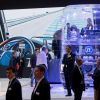The intelligent car
Information technology meets the automobile.

The automotive industry is doing its best to attract the Playstation generation. IT is being used more and more in cars. Classic features like performance or design are losing their importance. If we are to believe the trend researchers, while young people also want to get from A to B, the data-transfer rate is more important to them than the car's top speed. German manufacturers have recognized this. Online navigation, Google search and proprietary app stores have long been standard at Audi, BMW, Mercedes and VW. Complete connectivity with the digital world seems only a couple of years away.
If the Mercedes developers have their way, the car of tomorrow will be a digital companion with almost psychic capabilities. As though it could read the driver's mind, the on-board computer knows what s/he wants and automatically regulates all the corresponding functions accordingly – from the destination to the inside temperature to the radio station. The project is called Predicted User Experience and is based on the meticulous observation of routines and habits. Mercedes is not alone here. VW, too, is developing a self-learning navigation system which, if asked, can send the driver automatically to the place where the Facebook friends meet, for example.
The car regulates the room temperature at home
The developers' visions aren't limited to the car alone either; they want to connect it with almost everything and everyone. For one thing, they're integrating so-called "wearables" – computers you can wear on your body like Google Glasses or the first smart watches. And for another, a car can also talk with the infrastructure, and even change the room temperature at home or in the office depending on the expected time of arrival – or observe the weather so thoroughly that you will automatically be woken up a few minutes earlier than planned if road conditions turn wintry and there are hold-ups in rush-hour traffic.
New instruments, new apps and comprehensive networking will thoroughly change our lifestyle. But the actual art of driving is also about to change profoundly thanks to modern information technology. The Audi of tomorrow, for example, knows when traffic lights will turn red or green and when the next parking space will be free in a nearby street. The BMW of the future might well drive itself into the multi-storey car park. And Mercedes is promising that cars from Stuttgart will already be riding the motorways driverless as early as this decade.

